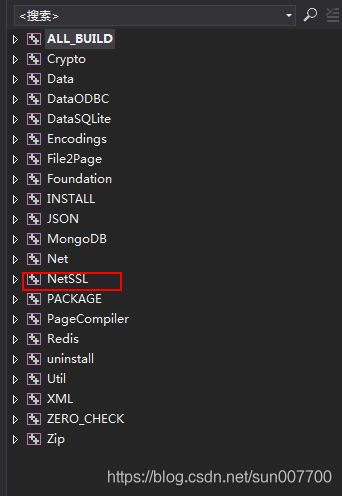VC - vs2017里poco的websocket使用netssl
1. 首先下载openssl库
http://slproweb.com/products/Win32OpenSSL.html
2. Install OpenSSL (we assume you install to d:\OpenSSL32)
3. 编辑buildwin.cmd,添加如下内容:
set OPENSSL_DIR=d:\OpenSSL32
set OPENSSL_INCLUDE=%OPENSSL_DIR%\include
set OPENSSL_LIB=%OPENSSL_DIR%\lib;%OPENSSL_DIR%\lib\VC
set INCLUDE=%INCLUDE%;%OPENSSL_INCLUDE%
set LIB=%LIB%;%OPENSSL_LIB%然后使用git bash命令
mkdir cmake_build_x86
cd cmake_build_x86
cmake -G "Visual Studio 15 2017" ..
打开工程,看到netssl模块,开始编译即可
其他工程使用的时候,在工程里添加
d:\OpenSSL32\include
d:\OpenSSL32\lib\VC
代码例子
Poco websocket库特点:
1,使用http/https ClientSession创建websocket client
2,是同步的,这对C++桌面编程来说应该是够用的.
3,依赖openssl.
代码如下:
#include "stdafx.h"
#include
#include
#include "Poco/Net/WebSocket.h"
#include "Poco/Net/HTTPClientSession.h"
#include "Poco/Net/HTTPRequest.h"
#include "Poco/Net/HTTPResponse.h"
#include "Poco/Net/ServerSocket.h"
#include "Poco/Net/NetException.h"
#include "Poco/Exception.h"
#include "Poco/Net/HTTPSClientSession.h"
#include "Poco/URIStreamOpener.h"
#include "Poco/StreamCopier.h"
#include "Poco/Path.h"
#include "Poco/URI.h"
#include "Poco/SharedPtr.h"
#include "Poco/Exception.h"
#include "Poco/Net/HTTPStreamFactory.h"
#include "Poco/Net/HTTPSStreamFactory.h"
#include "Poco/Net/FTPStreamFactory.h"
#include "Poco/Net/SSLManager.h"
#include "Poco/Net/KeyConsoleHandler.h"
#include "Poco/Net/ConsoleCertificateHandler.h"
#include "Poco/Net/AcceptCertificateHandler.h"
#include "Poco/Net/SecureStreamSocket.h"
#include "Poco/Net/X509Certificate.h"
#include
using Poco::Net::HTTPSClientSession;
using Poco::Net::HTTPClientSession;
using Poco::Net::HTTPRequest;
using Poco::Net::HTTPResponse;
using Poco::Net::HTTPServerRequest;
using Poco::Net::HTTPServerResponse;
using Poco::Net::WebSocket;
using Poco::Net::WebSocketException;
using Poco::Exception;
using Poco::URIStreamOpener;
using Poco::StreamCopier;
using Poco::Path;
using Poco::URI;
using Poco::SharedPtr;
using Poco::Exception;
using Poco::Net::HTTPStreamFactory;
using Poco::Net::HTTPSStreamFactory;
using Poco::Net::FTPStreamFactory;
using Poco::Net::SSLManager;
using Poco::Net::Context;
using Poco::Net::KeyConsoleHandler;
using Poco::Net::PrivateKeyPassphraseHandler;
using Poco::Net::InvalidCertificateHandler;
using Poco::Net::ConsoleCertificateHandler;
using Poco::Net::AcceptCertificateHandler;
using Poco::Net::X509Certificate;
int main(int argc, _TCHAR* argv[])
{
char buffer[1024];
int flags;
int n;
std::string payload;
try
{
Poco::Net::initializeSSL();
SharedPtr pCert = new ConsoleCertificateHandler(false); // ask the user via console
Context::Ptr pContext = new Context(Context::TLSV1_CLIENT_USE, "", "", "rootcert.pem", Context::VERIFY_RELAXED, 9, false, "ALL:!ADH:!LOW:!EXP:!MD5:@STRENGTH");
SSLManager::instance().initializeClient(0, pCert, pContext);
HTTPSClientSession cs("echo.websocket.org", 443);
HTTPRequest request(HTTPRequest::HTTP_GET, "/","HTTP/1.1");
HTTPResponse response;
std::string cmd;
WebSocket * ws = new WebSocket(cs, request, response); // Causes the timeout
payload = "SHAKETHAND";
ws->sendFrame(payload.data(), payload.size(), WebSocket::FRAME_TEXT);
n = ws->receiveFrame(buffer, sizeof(buffer), flags);
std::cout<<"return:"<shutdown();
}
catch (Poco::Exception& ex)
{
std::cout << "Error: " <<__FILE__<<":"<<__LINE__<<":"<< ex.displayText() << "\n";
return -1;
}
return 0;
}
http://www.ynpxrz.com/n807931c2023.aspx
https://www.cnblogs.com/bigben0123/p/3489461.html
/============================================================================
#include
#include
#include
#include
#include
#include
#include
#include
using Poco::Net::HTTPClientSession;
using Poco::Net::HTTPRequest;
using Poco::Net::HTTPResponse;
using Poco::Net::HTTPServerRequest;
using Poco::Net::HTTPServerResponse;
using Poco::Net::WebSocket;
using Poco::Net::WebSocketException;
using Poco::Exception;
using namespace std;
int ws_main() {
char buffer[1024];
int flags;
int n;
std::string payload;
try {
HTTPClientSession cs("echo.websocket.org", 80);
HTTPRequest request(HTTPRequest::HTTP_GET, "/", "HTTP/1.1");
HTTPResponse response;
std::string cmd;
WebSocket * ws = new WebSocket(cs, request, response); // Causes the timeout
payload = "SGClient: Hello World!";
cout << "Send: SGClient: Hello World!" << endl;
ws->sendFrame(payload.data(), payload.size(), WebSocket::FRAME_TEXT);
n = ws->receiveFrame(buffer, sizeof(buffer), flags);
buffer[n] = '\0';
cout << "Received: " << buffer << endl;
while (cmd != "exit") {
cmd = "";
cout << "Please input[exit]:";
std::cin >> cmd;
ws->sendFrame(cmd.data(), cmd.size(), WebSocket::FRAME_TEXT);
n = ws->receiveFrame(buffer, sizeof(buffer), flags);
buffer[n] = '\0';
if (n > 0) {
std::cout << "Receive: " << buffer << std::endl;
}
}
ws->shutdown();
} catch (Exception ex) {
cout << ex.displayText() << endl;
cout << ex.what() << endl;
return -1;
}
}


